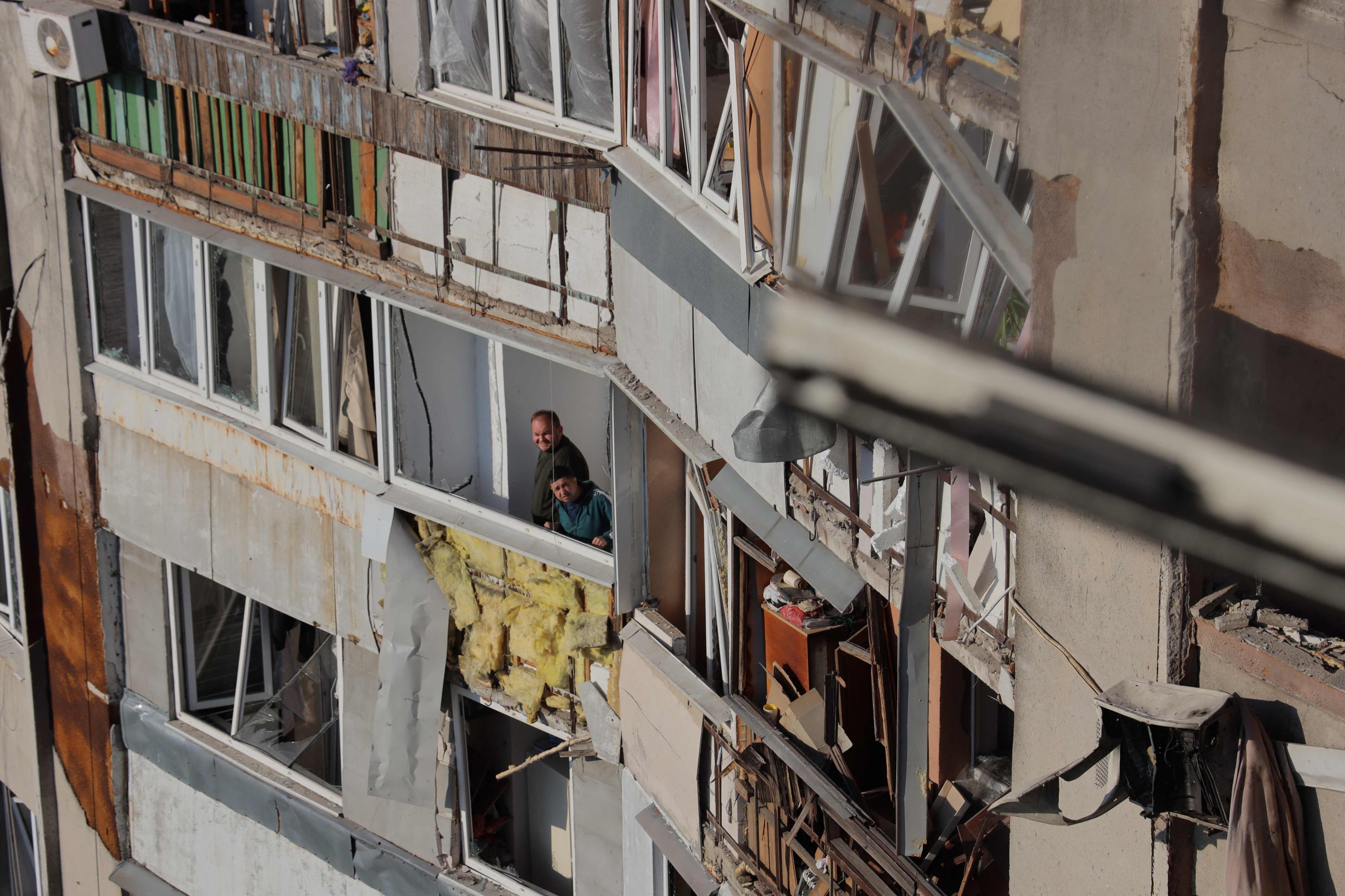© Turkuvaz Haberleşme ve Yayıncılık 2026
Just hours after Ukraine and the U.S. sealed a landmark deal granting Washington access to Kyiv’s mineral resources, deadly drone strikes on both sides of the war left civilians reeling.
A Ukrainian drone attack Thursday hit a crowded market in Oleshky, a Russian-occupied town in southern Kherson, killing at least seven people and injuring more than 20, according to Moscow-appointed Gov. Vladimir Saldo.
“The market was crowded,” Saldo said on Telegram, accusing Ukraine of launching follow-up drones to target survivors.
That same morning, a Russian drone strike tore through Odesa, Ukraine’s key Black Sea port, killing two people and wounding 15, emergency officials reported.

Regional Governor Oleh Kiper said the barrage struck apartment buildings, private homes, a supermarket and a school.
Videos shared by Kiper on Telegram showed a high-rise building with a severely damaged facade, a shattered storefront and firefighters battling flames.
In Kharkiv, Ukraine’s second-largest city, a drone struck and ignited a fire at a gas station in the city center, according to Mayor Ihor Terekhov.
Following the attacks, Ukrainian President Volodymyr Zelenskyy said Russia had ignored a U.S. proposal for a full and unconditional cease-fire for more than 50 days.
“There were also our proposals – at the very least, to refrain from striking civilian infrastructure and to establish lasting silence in the sky, at sea and on land,” he said. “Russia has responded to all this with new shelling and new assaults.”
The U.S. and Ukraine on Wednesday signed an agreement granting American access to Ukraine’s vast mineral resources, finalizing a deal months in the making that could enable continued military aid to Kyiv amid concerns that President Donald Trump might scale back support during ongoing peace negotiations with Russia.
Zelenskyy originally proposed such a deal last year as a way to help secure Ukraine’s future by tying it to U.S. interests. Ukrainian officials said earlier drafts of the accord would have reduced Kyiv to a junior partner and granted Washington unprecedented control over the country’s resources, but that the version signed Wednesday was far more beneficial to Ukraine.
Zelenskyy said Thursday that the minerals agreement was the “first result” of his meeting with Trump at the Vatican during the pope’s funeral, calling the deal “truly historic.”
During his nightly address, he said there were no debts to be repaid from past U.S. aid under the terms of the deal. He added that the agreement will be sent to parliament for ratification and emphasized the importance of avoiding delays.
According to Zelenskyy, the agreement is “truly equal” and “creates an opportunity for investments in Ukraine.”
“This is working together with America on fair terms, when both the Ukrainian state and the U.S., which helps us in defense, can earn in partnership,” he said.
Tymofiy Mylovanov, former economy minister and current president of the Kyiv School of Economics, said Thursday that despite what he described as “unimaginable pressure” during negotiations, Ukraine succeeded in defending its interests.
“This is a huge political and diplomatic win for Ukraine,” Mylovanov wrote on Facebook. “The deal looks fair.”
He said the agreement does not limit Kyiv to selling exclusively to American buyers. Instead, it acknowledges contributions from both sides: Ukraine through revenue from new projects and the U.S., potentially through continued military assistance.
In Kyiv, residents expressed mixed reactions Thursday to the agreement, with many saying they had not yet had time to fully understand its implications.
Among those who spoke to The Associated Press (AP) was Diana Abramova, who attended a rally in Independence Square demanding information on missing Ukrainian soldiers. Her father, Valentyn Stroyvans, went missing in combat last year.
“Any news is hard to take – whether it’s about negotiations or anything else,” Abramova said. “But I still believe and hope that any action will bring us closer to one thing: Ukraine’s victory. Only victory.”
Seventy-four-year-old university lecturer Natalia Vysotska said she wasn’t familiar with the deal’s details but remained cautiously optimistic.
“I don’t know what the terms are – they may not be favorable for Ukraine at all. Still, if it was signed, our experts must have weighed the pros and cons. I hope it will be beneficial.”
Others shared more skepticism. Iryna Vasylevska, a 37-year-old Kyiv resident, expressed frustration with the broader implications of the deal.
She told the AP she felt terrible that “our land is just a bargaining chip for the rest of the world and that we do not have our own full protection, but rely on someone.”
“My vision is that instead of strengthening ourselves, we continue to give it all away. I feel sorry for our land and for our people,” she said.
Reaction to the signing was generally muted in Moscow on Wednesday, a public holiday in Russia. But Dmitry Medvedev, deputy chair of Russia’s National Security Council, said Trump had forced Ukraine to effectively “pay” for American military aid with its mineral resources.
“Now military supplies will have to be paid for with the national wealth of a disappearing country,” he claimed on Telegram.
Vladimir Rogov, chair of the Russian Civic Chamber’s commission on sovereignty, told state news agency RIA Novosti that Zelenskyy had effectively handed Ukraine over to “legally prescribed slavery.”
